Award Recipients
Veterinary Community Award
The Veterinary Community Award was established to recognize individuals and organizations who have given outstanding service to animals in our community. Below are some of the recipients.
2010 Veterinary Community Award Recipient
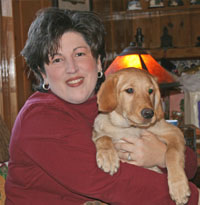 Marisha Teagardin
Marisha Teagardin
Ms. Marisha Teagardin is our 2010 TCVMA Community Award recipient for her outstanding passion and dedication to animal welfare. She was nominated by Dr. Chris Norwood and he has personally witnessed Mrs. Teagardin working all hours of the night, traveling great distances, working in adverse weather, and laboring for animals despite severe medical conditions all with great personal sacrifice.
Marisha began her journey in the dog world as a child and has continued with tireless dedication throughout her life. She owes her 17+ year professional career in training to a cattle dog named Eli. While working with Eli, she adopted her first black Lab, Alex, from the Friends of the Humane Society where she actively volunteered. Alex stole her heart, as only a Lab can do…and the rest is history! Marisha has challenged herself to learn everything she could about the Lab breed. So far, she has whelped or raised 13 litters of rescue Lab puppies in the past 12 years, 7 of those for DFW Lab Rescue. Over the past 16 years, she has trained hundreds of Labs in areas that ranged from puppy manners and obedience, to field work and ordinance detection. Having worked with some of the toughest cases, she has developed a special talent in evaluating Labs for the program as well as how to teach those skills to others. Under her leadership as Director of Incoming for DFW Lab Rescue over the past four years, the return and failure rates have continued to decline while the successful placements, fosters and volunteers have continued to rise.
In addition to her work with DFW Lab Rescue, she is a court qualified expert in temperament assessment and various other areas, and has also headed the North Texas Animal Rescue Alliance's efforts to establish an emergency evacuation center at UNT for animals displaced by Hurricanes Katrina and Rita. Her proudest accomplishment to date is participating in the incredible group effort, Operation Hard Knocks, to rehabilitate 17 dogs that were kept in perpetual near death conditions all of their lives.
Marisha we thank you for all of your dedication and we celebrate you as this year's Community Award winner. Congratulations!
2009 Veterinary Community Award Recipient
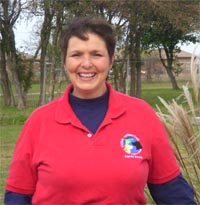 Karen Deeds
Karen Deeds
The relationship between dog and owner is one that is precious and this year’s TCVMA Community Award winner, Karen Deeds, is a shining of example of someone who is committed to furthering that special, human-animal bond. Karen devotes her time and effort tirelessly to the rescue community. She serves by evaluating, consulting and rehabilitating the dogs in their care to help place them in homes. She often takes on these special dogs in her own kennel for further rehabilitation so that they become adoptable. Through her dedication, she has saved numerous dogs with behavioral problems, including dogs who have aggressive tendencies or are simply out of control.
Karen founded Canine Connection in 1994 out of her compassion for the animals she helps and her method and philosophy in training, which is grounded in utilizing the principles of Psychology and positive reinforcement. Her method of training has successfully saved dogs who otherwise would have been deemed either too aggressive to be placed or too out of control to find a forever home.
Karen devotes a lot of time without compensation to various organizations and groups. She is a member of Troop 119 of Dog Scouts of America, is the evaluator for the Paws To Go Ministry Therapy Dog Program for the Fellowship Church, a founding instructor for the Gifted Animal Placement Program, and has been involved in the Assistance Dog Industry for 16 years. In addition, she is a Field Representative for Paw with a Cause (a non profit organization that trains and places Service, Hearing and Seizure response dogs throughout the United States) and this summer Karen won the first Extreme Mutt Makeover with a 2 ½ year old black lab named Tess that came from the Humane Society of North Texas. The event was designed to bring attention to the dogs in shelters everywhere and to show that they can accomplish amazing things with trust and training.
Karen’s passion and energy is endless and the TCVMA is proud to award her for her continued service to the community.
2008 Veterinary Community Award Recipient
 Kathryn Swearingen
Kathryn Swearingen
Kathryn Swearingen, a 14 year old young woman from Southlake, TX, has been a dedicated member of two very special organizations, the Girl Scouts of America and the Dog Scouts of America. As a member of these organizations for 10 years and 3 years respectively, she has demonstrated outstanding efforts in promoting the human and animal bond between seniors and their beloved pets.
This year, as a part of completing her Girls Scouts Silver project, she worked tirelessly in collecting donations (monetary, dog bowls, toys, flea and tick collars, brushes, etc.) for the pets of seniors in her community. She says, “Many people live on a limited budget during their elderly years and often are not able to afford food, medications and other necessities for their pets”.
Recognizing this struggle, she aimed to help by leading her Dog Scouts Troop 119 to raise awareness and support for this local cause. With the donations she has collected, her troop will provide approximately 120 doggie gift bags filled with dog food, treats, toys etc. to companion dogs on Meals on Wheels Clients this Christmas. She is an inspiration to us all.
2007 Veterinary Community Award Recipient
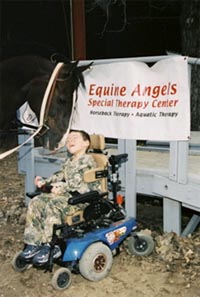 Equine Angels
Equine Angels
Dr. Brian and Gina Gray
Equine Angels was started in answer to a growing problem within our society. Children born with severe physical disabilities (those who may never ambulate or otherwise function independently) have the greatest need for genuine, quality therapy provided by licensed physical, occupational and speech therapists. However, they rarely receive the prescribed amount needed during their formative years for a variety of reasons.
Families can be misled and undereducated when it comes to the prognosis of their child’s challenging condition. Many families are unable to afford the expertise of the best practitioners, so they settle for what is available through public programs or nothing at all. Other constraints are placed by insurance carriers and restrictions are imposed by schools and employers. This can be the start of a lifetime of unjust treatment within our society unless someone steps in.
This disservice started one mother on a journey of passion fueled by her love for her non-ambulatory, non-verbal son and gave birth to Equine Angels. Over the years, the direction and growth of this program has been guided by the ever-present needs of Brian and Gina Gray's son, Spencer. Spencer is 11 years old and remains non-verbal and non-ambulatory. Although these facts have not and will not change, he is a healthy and valuable child who is worthy of living a full life. He and other children like him deserve to have the highest quality of life made available to them. Equine Angels believes that therapy is much more important than diagnosis because good therapy is overflowing with hope. This is the one thing that cannot be taken away, so it is this hope that inspires and drives their the program at Equine Angels.
2006 Veterinary Community Award Recipient
 Dr. S. Kent Glenn
Dr. S. Kent Glenn
A 1976 graduate of Colorado State University, Dr. S. Kent Glenn practices at Aledo Veterinary Clinic. During his 30-year career, he has been involved in youth educational and leadership activities and is dedicated to teaching students the technologies and skills involved in animal care reproduction. In 2005, Dr. Glenn assisted with displaced pets after the recent hurricanes on the Gulf Coast.
Dr. Glenn, along with doctors and staff of the Aledo Veterinary Clinic, were eager to help the four-legged victims of Hurricane Katrina. They were quickly joined by the staff of other clinics in the area. Donations of pet food, water, equipment, medical supplies, vehicle use and money for fuel were gratuitously accepted.
They quickly set out to receive and temporarily care for the pets belonging to the staff of a New Orleans Hospital. They wanted to serve the dedicated medical staff and their pets that could not evacuate the area prior to Hurricane Katrina. Forty-six dogs and 13 cats were brought to Mercy Hospital in New Orleans (also known as Lindy Boggs Hospital) when their owners, all employees of the hospital, reported for work during the hurricane. Staff and patients were eventually rescued, but the animals remained behind with a caretaker.
Dr. Glenn and his team were are able to safely receive the evacuated pets and transport all of them back to Aledo where they were treated for medical problems, groomed, tagged for identification and placed in temporary foster homes until they could be reunited with their families.
2005 Veterinary Community Award Recipient
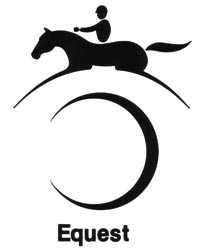 Equest Therapeutic Horsemanship
Equest Therapeutic Horsemanship
Equest provides therapeutic sports riding classes and hippotherapy to over 200 clients every week. After being the first therapeutic riding program in Texas founded in 1981, they have become the largest non-profit therapeutic riding center in the state. Equest serves children and adults with all types of physical, mental and emotional disabilities. Equest has earned the respect of other therapeutic programs nationwide and is considered a national role model for therapeutic riding.
Their full-time staff currently has five NARHA certified instructors. The therapy staff is licensed and has advanced training in hippotherapy. Their staff is nationally respected for its expertise. Equest's program is about children and adults who reach beyond the confines of their disabilities because of the intervention of this special therapy team.
Physically, equine-assisted therapy takes disabled riders through complex series of movements on the horse, which consciously and unconsciously use all the body's muscles improving posture, balance and muscle control. Mentally, equine-assisted therapy increases concentration, improves sequential thought processing, increases the rider's ability to articulate emotions, and develops spatial awareness. Emotionally, equine-assisted therapy provides the opportunity for riders to bond with the horse, instructor, and volunteers, which assists in the development of trust. It is also effective in calming emotive outbursts and reinforcing appropriate behaviors. Socially, equine-assisted therapy nurtures a positive self-image. Disabled riders often experience independence for the first time in their lives. They also develop an awareness of being part of a team.
2004 Veterinary Community Award Recipient
 Karen Bonds
Karen Bonds
When most people think of opossum, they imagine an animal with big teeth and a rat-like tail. When Karen thinks of opossum, she sees an animal that plays a vital role in the urban ecosystem keeping populations of roaches, snakes and rats in check.
While rollerblading late one cold February night in 1987 with the family dog, Karen Bonds came upon a tiny opossum that had been separated from its mother. Ever since, she has specialized in the opossum, rehabilitating wildlife with the primary objective of returning it to its natural habitat to safely coexist with man.
In her efforts, Karen spends several thousand dollars a year of her own money on food and veterinary bills to aid her cause. During spring it is not uncommon for Karen to have upwards of 150 opossum, mothers and babies included, staying at her house at a time. Although daily duties of animal laundry, poop scooping and the feeding of dead mice seem unpleasant to most, the feeling of satisfaction Karen receives returning and injured or orphaned opossum to the wild is well worth the sacrifices.
With her dedication of both finance and time Karen Bonds is a true example of what the Veterinary Community Award is about.
2003 Veterinary Community Award Recipient
 Little Orphan Angels: Larry Erdman, Beth Erdman, and Kathi Harte
Little Orphan Angels: Larry Erdman, Beth Erdman, and Kathi Harte
Little Orphan Angels Animal Rescue (LOA) is a non-profit humane animal organization dedicated to the rescue and adoption of companion cats and dogs, which are needlessly euthanized because they are homeless. In the past year, LOA has rescued over 500 animals from local shelters and from individuals and has provided them medical care, loving foster homes and ultimately a permanent adoptive home.
LOA also recognizes that rescue and adoption are only part of the solution to the problem of pet over-population and have created additional programs to help address this need. The first is education. They provide educational materials to the public about the plight of homeless animals and the need for responsible pet ownership and spay and neutering. LOA has teamed up with local schools to deliver this to elementary age children as well as during our weekly adoption events.
address this need. The first is education. They provide educational materials to the public about the plight of homeless animals and the need for responsible pet ownership and spay and neutering. LOA has teamed up with local schools to deliver this to elementary age children as well as during our weekly adoption events.
LOA’s second program is helping seniors and shut-ins who may have to otherwise give up an older animal by providing food and care to those animals. They are partnering with Meals on Wheels of Tarrant County to deliver pet food and provide medical care to those in need. Since its inception in December of last year, they have delivered over 5000 pet meals and helped raised donations to pay for medical treatment for deserving residents.
2002 Veterinary Community Award Recipient
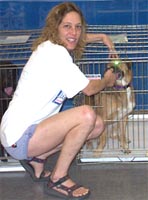 Barbara Richardson, Founder of Homeward Bound Animal Rescue
Barbara Richardson, Founder of Homeward Bound Animal Rescue
Growing up in New York , her passion for helping those that couldn’t fend for themselves originated more than 15 years ago. In 1991, Barbara moved from New York toTexas in pursuit of a career opportunity. Here she met Skip, and was married in September of 1992.
After a three year sabbatical from the world of animal rescue, Barbara could be silent no longer and started Homeward Bound Animal Rescue (HBAR) in 1994. Most of the animals are pulled from shelters and animal control facilities just before their “time is up.” Utilizing foster homes, the animals are given medical and personal attention to ready them for adoption. Barbara has often taken on “special needs” cases and is always willing to go the extra mile. Many people have followed in her footsteps and multiple rescue organizations have been formed to help fight the battle for those who can’t fight for themselves.


